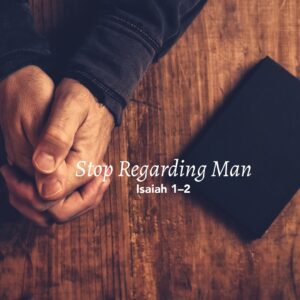Isaiah 1-2: Stop Regarding Man
September 1, 2024
TODAY'S BIBLE READING:
Isaiah 1-2, Proverbs 18, Luke 20:27-40, Hebrews 1:1-9

We enter now perhaps one of the greatest works of literature ever written. More to the point, Isaiah is perhaps the greatest of the Old Testament prophetic books. The style is at times sublime, the message not only “timeless” but timelessly profound, and its words, while deep and ever rich, have some of the most famous and clearest prophecies of “the servant” and “the suffering servant,” that is the Christ called Jesus and his cross.
We will barely do justice to the brilliance of these words, certainly not in any finicky exactitude, but we can bask in the warmth of their light. Almost certainly, the best modern commentary on Isaiah was written by the recently deceased great scholar and Bible teacher Alec Motyer. It is not only extremely accurate technically, it also manages to be edifying and uplifting all at the same time. If you want to plumb the depths of Isaiah, I commend Motyer’s commentary to you.
For our two chapters this morning—what can we say? The first chapter starts with Isaiah’s denunciation of a people who “do not know” and “do not understand” (1:3). How unlikely it was that this was a fair description of Israel! How proud they were of their knowledge of God—and how little really and in truth they understood! They are, indeed, “laden with iniquity” (1:4). Their lack of knowledge of God has led to ill practice and misdeeds. In fact, they are now aptly called “rulers of Sodom” (1:10). No greater rebuke could be given to a Bible-literate people! “You people of Sodom”—imagine saying that at church on a Sunday morning! Or imagine going to a presbytery and calling them “rulers of Sodom.” But such was the situation among God’s people at the time. And the faithful prophet must call them to repent (1:27).
Their worship was particularly offensive. They had “vain offerings” and other ceremonies that God “cannot endure” anymore (1:13). The reason? It was that these worship meetings were being used by the people to hide from the truth of their sinfulness. They were going to church regularly but acting badly, somehow thinking that going to church would make up for their poor behavior. But all that did was make God angrier at not just their sin but their hypocrisy now, too. Instead he wished they would “learn to do good; seek justice, correct oppression” (1:17).
The answer to this problem? “Come now, let us reason together…though your sins are like scarlet they shall be white as snow” (1:18). God had a message to them, but they must understand that message, come back to God, be reconciled to him, and stop rebelling against God. If that happens, there will be restoration. The day of the LORD is a day that is against the proud (2:12), but there will be a new day of blessing for those who repent. Such is the hope that is interwoven in the succeeding verses and that finishes at the end of chapter 2 with the last great diagnosis of their problem and the offer of a solution: “Stop regarding man in whose nostrils is breath, for of what account is he?” (2:22).
The application of all this to us, dear reader, is so plain it might almost appear rude to point it out too obviously. But like all prophetic messages, faithfulness to it means looking with honesty at its relevance and bringing our lives into line with it. Religion by itself—religious festivals and ceremonies—is not the point. What God is looking for is an authenticity of lifestyle that is in accordance with the Scripture and that is honestly obeying God. It is, in others words, to live a life centered upon God, not a life that is governed by the desires of people, ourselves, or others around us. That is the path of freedom, renewal, and blessing. “Come let us reason together.” Turn back to God and put God at the center of your life today.
ABOUT THE AUTHOR
Josh Moody (Ph.D., University of Cambridge) is the senior pastor of College Church in Wheaton, IL., president and founder of God Centered Life Ministries, and author of several books including How the Bible Can Change Your Life and John 1-12 For You.
WANT MORE?
To receive God Centered Life devotionals directly in your inbox, as well as other resources, enter your email address in the form at the bottom of this page and click "subscribe."

